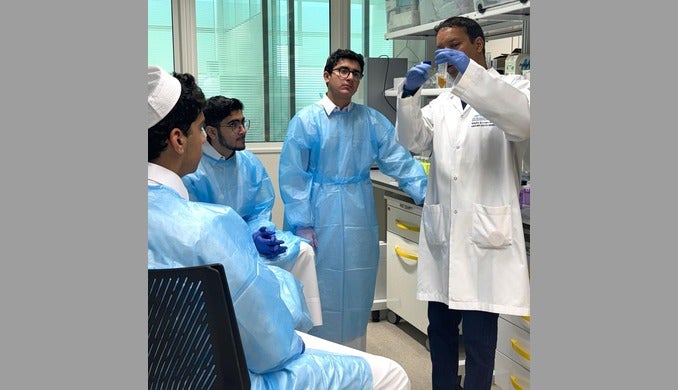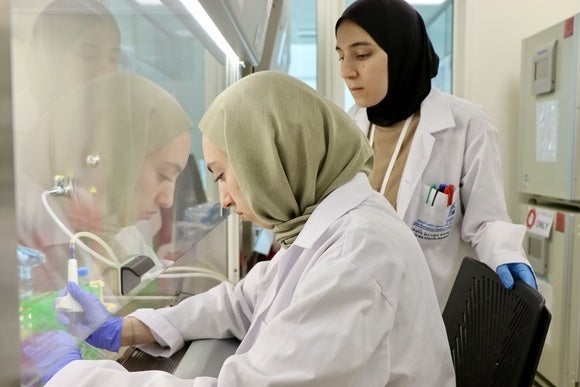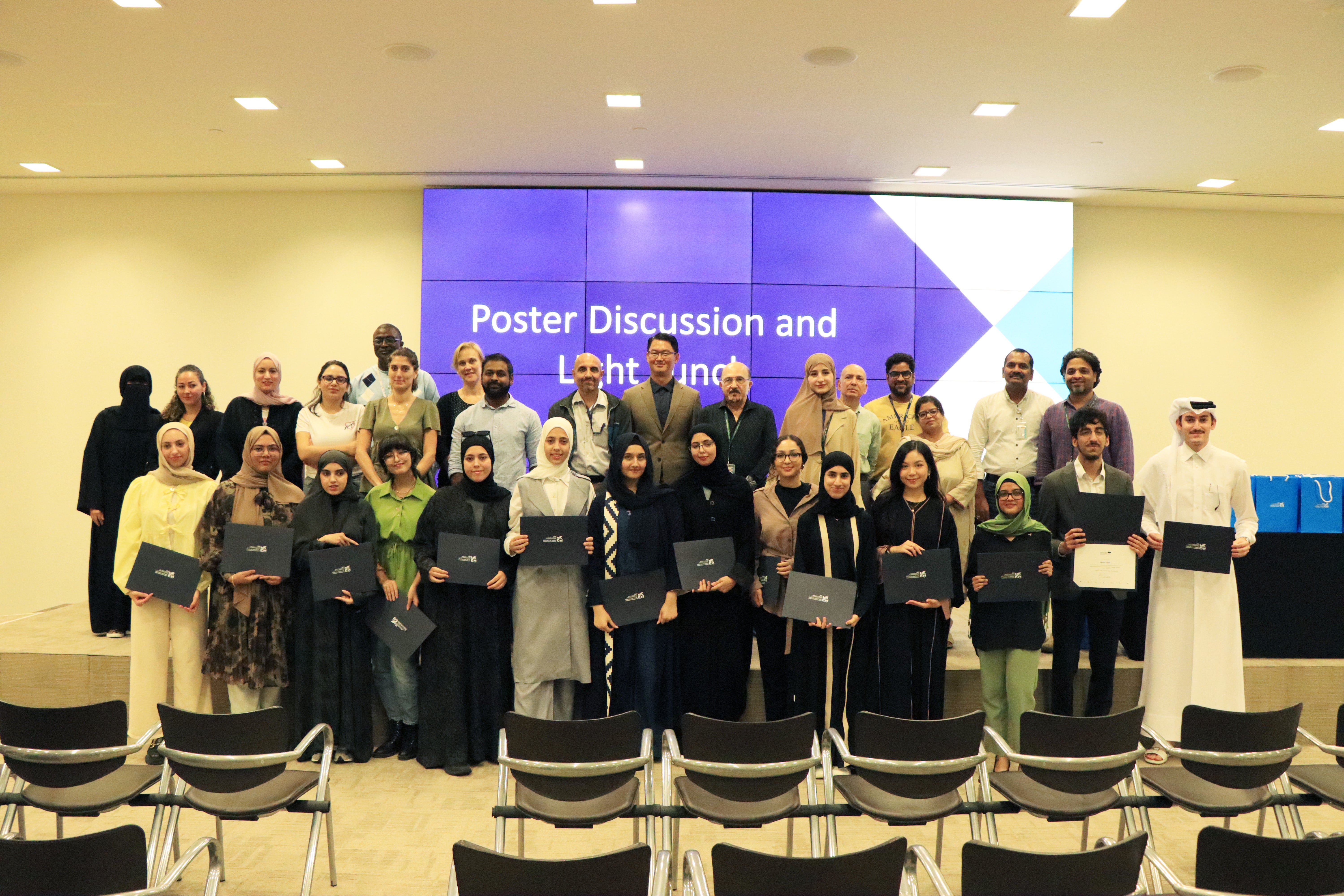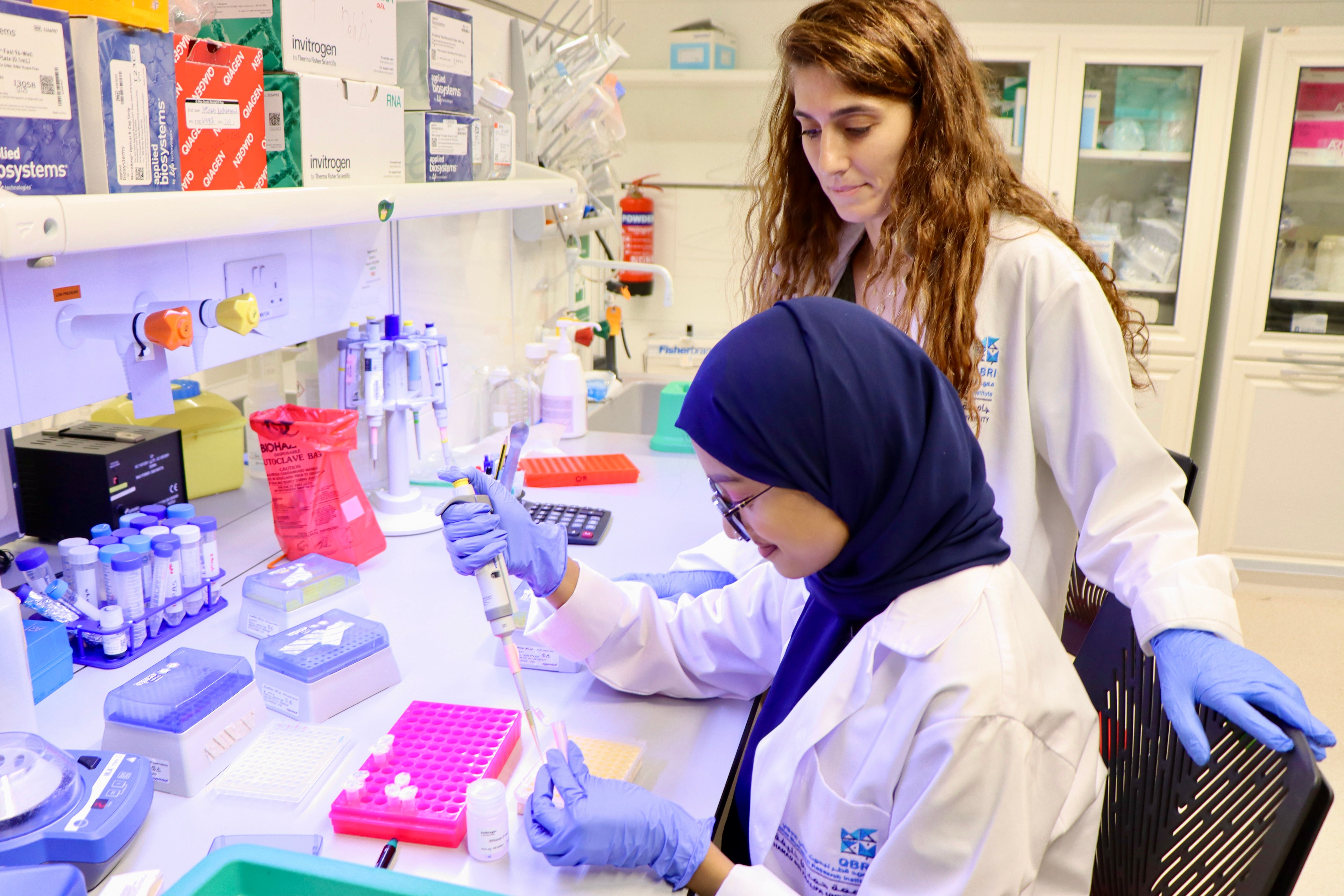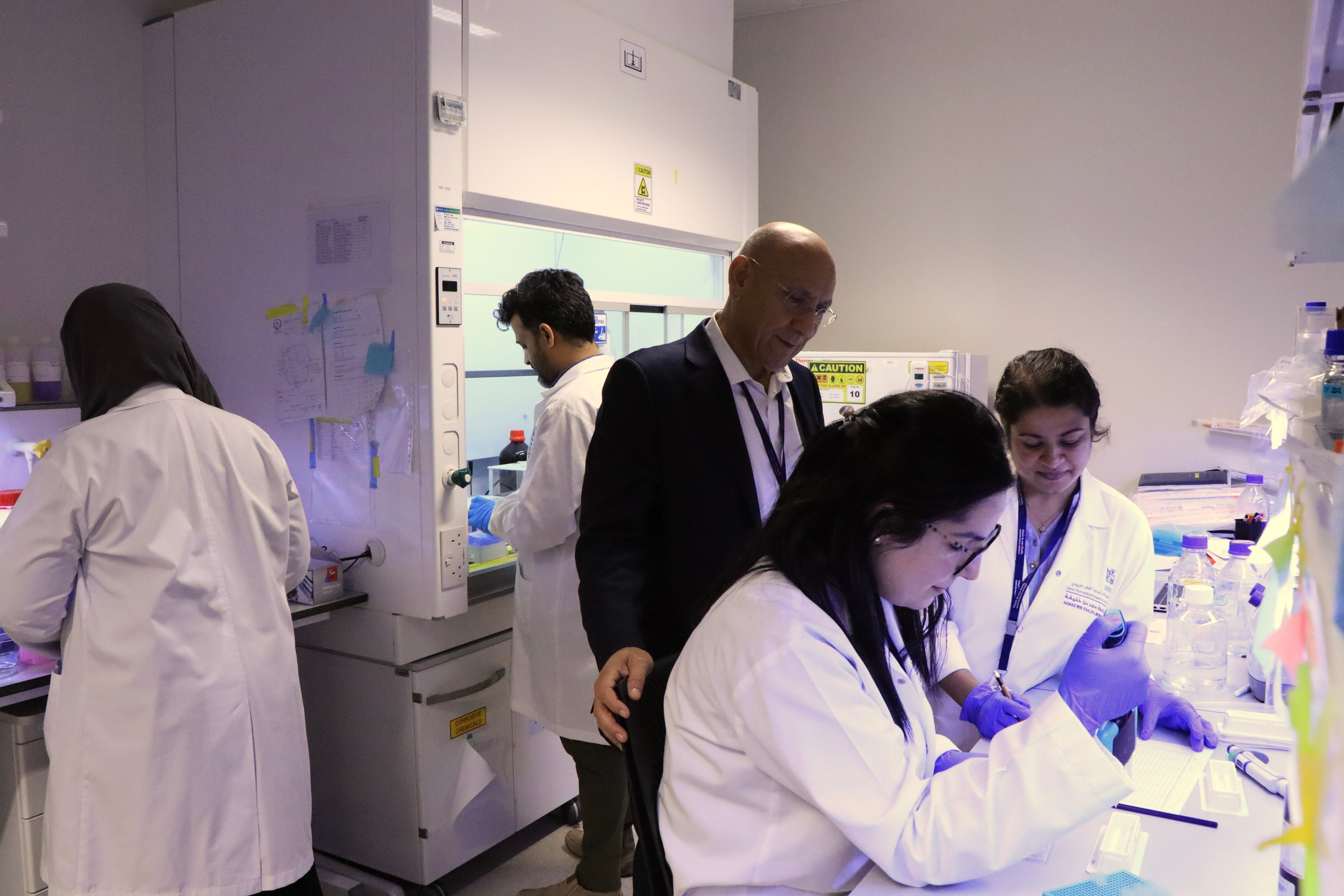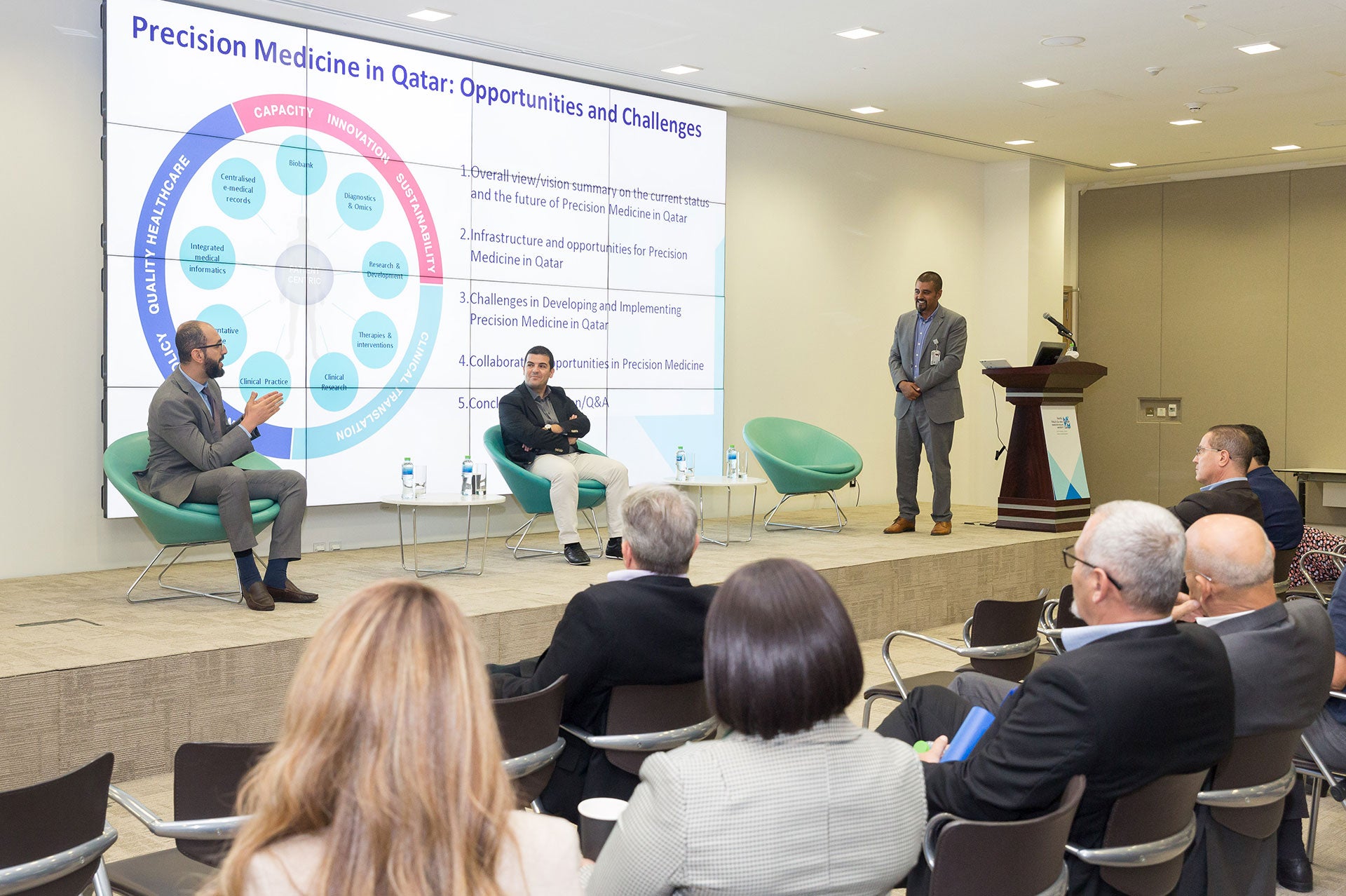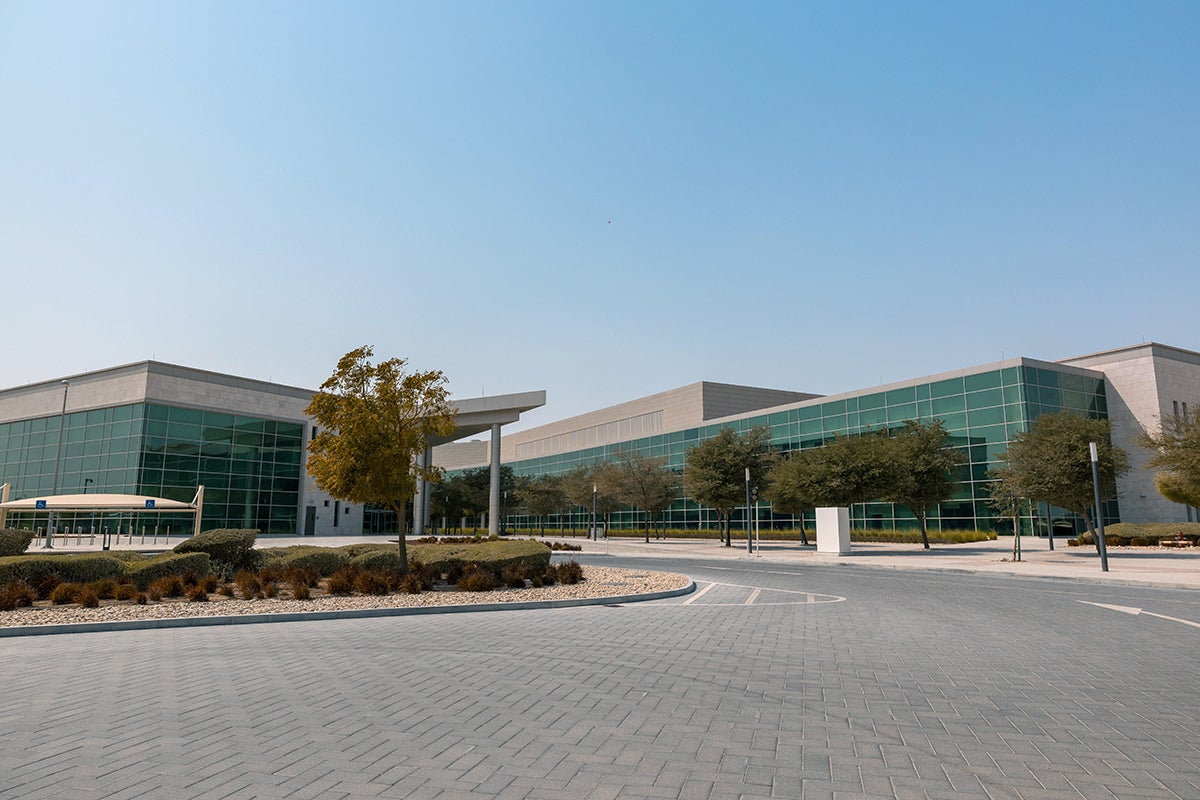
QBRI Tackles Genome-Related Complexities in Triple Negative Breast Cancer
QBRI exploits novel AI approach to understand the human genome’s dark matter and diverse characteristics of tumors
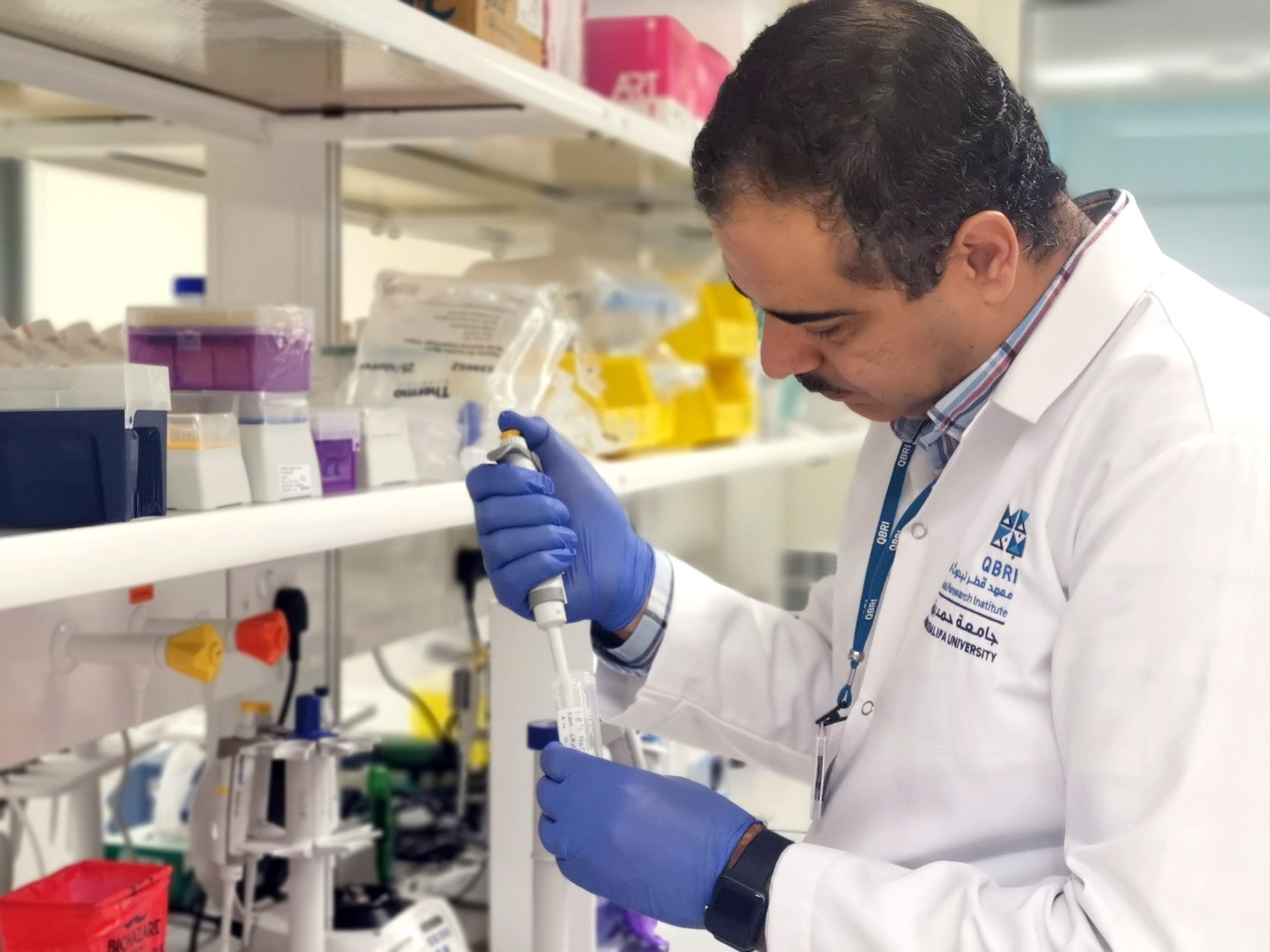
Qatar Biomedical Research Institute (QBRI), part of Hamad Bin Khalifa University (HBKU), recently published papers in two prestigious scientific journals identifying research findings on gene regulation in human cancers and a novel tumor classification method that may lead to tailored treatment for triple negative breast cancer.
One of the most astonishing findings of recent genomic research is that only 2% of the human genome encodes functional proteins, an essential component of the work done by living cells. The function of the remaining, vast majority of the genome - so-called “dark matter” or “junk DNA” - remains to be unraveled. This data is puzzling, given that approximately 75% of the genome can be active in one cell at any time.
“The emerging findings have revealed the transcription (or copying) of the vast majority of our DNA to RNA, without it being translated into functional proteins (called non-coding RNAs). However, having worked in the area of non-coding RNAs for more than 15 years, we now know more than ever about their regulatory role in different cell functions and their importance in driving the formation of tumors (tumorigenesis),” explained Dr. Nehad Alajez, Senior Scientist at QBRI’s Translational Cancer and Immunity Center (TCIC).
In a paper published in the prestigious Seminars in Cancer Biology by Elsevier, Dr. Alajez and his team highlight the crucial role of long non-coding RNAs (lncRNAs) in regulating the genome through their interactions with RNA-binding proteins (RBPs). The paper covers various aspects of the interplay between lncRNAs and RBPs in the context of human cancers.
In breast cancer, a major problem accounting for the majority of cancer-related deaths in women, is the heterogeneous nature of the disease. While the classification of breast cancer into three types, HR-positive, HER2 positive, and triple-negative breast cancer (TNBC), has helped provide tailored treatment for patients in each subtype, tumor heterogeneity (variations of cancer cell types within the same tumor) and the differences in how patients respond to therapy remain a major clinical challenge.
Thinking differently is the key to success, according to Dr. Alajez, who brings strong expertise in transcriptome analysis, non-coding RNAs, and biomarker discovery to QBRI’s TCIC in their current focus on translational oncology and precision medicine research. In a second paper, published in Non-Coding RNA, an open-access MDPI journal, the team used a novel approach to characterize the expression of tens of thousands of lncRNAs in TNBC, using artificial intelligence (AI) to unravel the heterogeneity of the disease. The team was able to classify TNBC into four different groups, with each group expressing a defined set of lncRNAs.
The authors revealed functional differences among the identified clusters and predicted relapse-free survival for patients based on this novel classification method. These findings could potentially have an impact on patient stratification into subgroups within the TNBC subtype, for tailored treatment in the future.
To expand on this area, the team is currently conducting a large-scale experiment, employing a gene editing tool (called CRISPR-Cas9 screening) that enables the manipulation of DNA in the cell to study their function. The results will offer insights into the function of hundreds of lncRNAs in TNBC, paving the way to use these candidates as potential prognostic and therapeutic targets. The outcomes could provide the first-ever lncRNA dependency map of TNBC in the context of resistance to chemotherapy. The research is being done in collaboration with University College Dublin, with support from Qatar National Research Fund.
For more information about the Translational Cancer and Immunity Center at QBRI, a national center of excellence and a global hub for biomedical and translational research related to diabetes, cancer, and neurological disorders, please visit https://qbri.hbku.edu.qa.
Related News

100-Year Anniversary of the Discovery of Insulin is of Great Relevance to QBRI
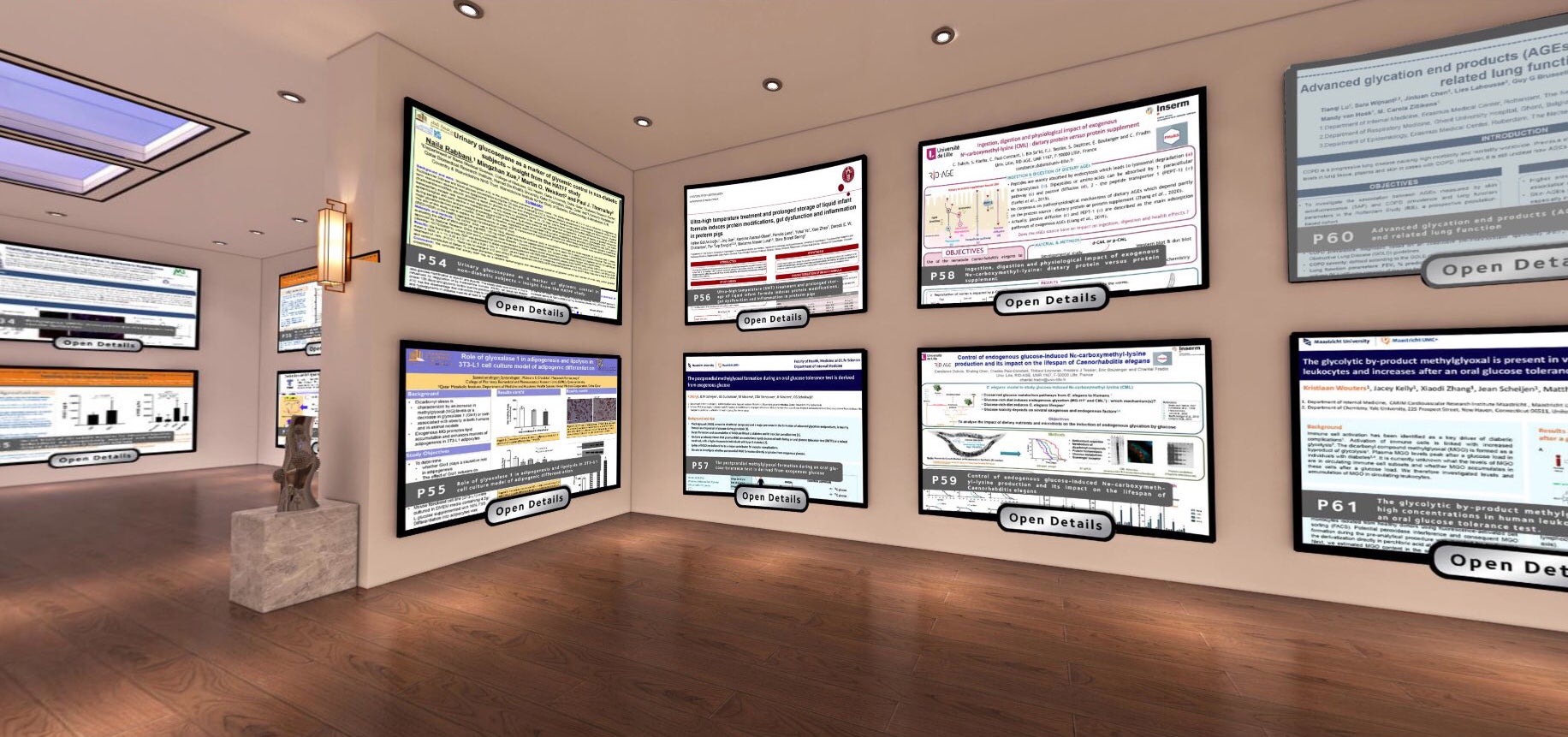
Qatar Biomedical Research Institute and Qatar University Scientists Conclude the International Symposium on Role of Glycation in Food-Health-Disease

QBRI Partners with PHCC and QCRI to Combat Prediabetes Through New Screening Tool

QBRI and Sultan Qaboos University Collaborate on Autism Spectrum Disorder Research

HBKU's QBRI Unveils Promising Arabic Stimuli: A Step Forward in Autism Spectrum Disorder (ASD) Diagnosis
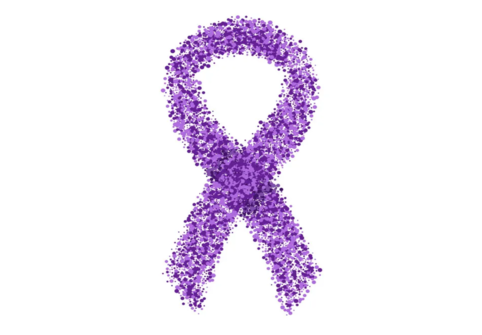
Unveiling New Insights into Dementia: Autoantibodies and Blood-Based Biomarkers
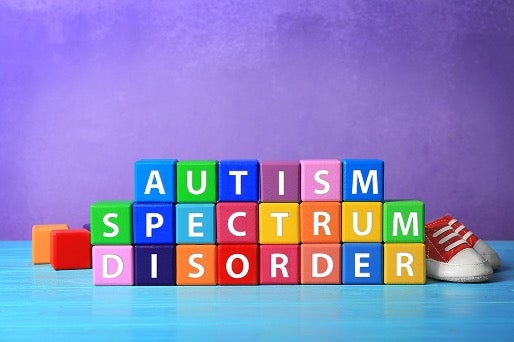
Embracing the Colors of the Autism Spectrum: The Importance of Early Intervention and Advocacy

100-Year Anniversary of the Discovery of Insulin is of Great Relevance to QBRI

Qatar Biomedical Research Institute and Qatar University Scientists Conclude the International Symposium on Role of Glycation in Food-Health-Disease

QBRI Partners with PHCC and QCRI to Combat Prediabetes Through New Screening Tool

QBRI and Sultan Qaboos University Collaborate on Autism Spectrum Disorder Research

HBKU's QBRI Unveils Promising Arabic Stimuli: A Step Forward in Autism Spectrum Disorder (ASD) Diagnosis

Unveiling New Insights into Dementia: Autoantibodies and Blood-Based Biomarkers

Embracing the Colors of the Autism Spectrum: The Importance of Early Intervention and Advocacy

100-Year Anniversary of the Discovery of Insulin is of Great Relevance to QBRI

Qatar Biomedical Research Institute and Qatar University Scientists Conclude the International Symposium on Role of Glycation in Food-Health-Disease

QBRI Partners with PHCC and QCRI to Combat Prediabetes Through New Screening Tool

QBRI and Sultan Qaboos University Collaborate on Autism Spectrum Disorder Research

HBKU's QBRI Unveils Promising Arabic Stimuli: A Step Forward in Autism Spectrum Disorder (ASD) Diagnosis

Unveiling New Insights into Dementia: Autoantibodies and Blood-Based Biomarkers

Embracing the Colors of the Autism Spectrum: The Importance of Early Intervention and Advocacy

100-Year Anniversary of the Discovery of Insulin is of Great Relevance to QBRI

Qatar Biomedical Research Institute and Qatar University Scientists Conclude the International Symposium on Role of Glycation in Food-Health-Disease

QBRI Partners with PHCC and QCRI to Combat Prediabetes Through New Screening Tool

QBRI and Sultan Qaboos University Collaborate on Autism Spectrum Disorder Research

HBKU's QBRI Unveils Promising Arabic Stimuli: A Step Forward in Autism Spectrum Disorder (ASD) Diagnosis

Unveiling New Insights into Dementia: Autoantibodies and Blood-Based Biomarkers

Embracing the Colors of the Autism Spectrum: The Importance of Early Intervention and Advocacy

100-Year Anniversary of the Discovery of Insulin is of Great Relevance to QBRI

Qatar Biomedical Research Institute and Qatar University Scientists Conclude the International Symposium on Role of Glycation in Food-Health-Disease

QBRI Partners with PHCC and QCRI to Combat Prediabetes Through New Screening Tool

QBRI and Sultan Qaboos University Collaborate on Autism Spectrum Disorder Research

HBKU's QBRI Unveils Promising Arabic Stimuli: A Step Forward in Autism Spectrum Disorder (ASD) Diagnosis

Unveiling New Insights into Dementia: Autoantibodies and Blood-Based Biomarkers

Embracing the Colors of the Autism Spectrum: The Importance of Early Intervention and Advocacy

100-Year Anniversary of the Discovery of Insulin is of Great Relevance to QBRI

Qatar Biomedical Research Institute and Qatar University Scientists Conclude the International Symposium on Role of Glycation in Food-Health-Disease

QBRI Partners with PHCC and QCRI to Combat Prediabetes Through New Screening Tool

QBRI and Sultan Qaboos University Collaborate on Autism Spectrum Disorder Research

HBKU's QBRI Unveils Promising Arabic Stimuli: A Step Forward in Autism Spectrum Disorder (ASD) Diagnosis

Unveiling New Insights into Dementia: Autoantibodies and Blood-Based Biomarkers

Embracing the Colors of the Autism Spectrum: The Importance of Early Intervention and Advocacy

100-Year Anniversary of the Discovery of Insulin is of Great Relevance to QBRI

Qatar Biomedical Research Institute and Qatar University Scientists Conclude the International Symposium on Role of Glycation in Food-Health-Disease

QBRI Partners with PHCC and QCRI to Combat Prediabetes Through New Screening Tool

QBRI and Sultan Qaboos University Collaborate on Autism Spectrum Disorder Research

HBKU's QBRI Unveils Promising Arabic Stimuli: A Step Forward in Autism Spectrum Disorder (ASD) Diagnosis

Unveiling New Insights into Dementia: Autoantibodies and Blood-Based Biomarkers

Embracing the Colors of the Autism Spectrum: The Importance of Early Intervention and Advocacy

100-Year Anniversary of the Discovery of Insulin is of Great Relevance to QBRI

Qatar Biomedical Research Institute and Qatar University Scientists Conclude the International Symposium on Role of Glycation in Food-Health-Disease

QBRI Partners with PHCC and QCRI to Combat Prediabetes Through New Screening Tool

QBRI and Sultan Qaboos University Collaborate on Autism Spectrum Disorder Research

HBKU's QBRI Unveils Promising Arabic Stimuli: A Step Forward in Autism Spectrum Disorder (ASD) Diagnosis

Unveiling New Insights into Dementia: Autoantibodies and Blood-Based Biomarkers

Embracing the Colors of the Autism Spectrum: The Importance of Early Intervention and Advocacy

100-Year Anniversary of the Discovery of Insulin is of Great Relevance to QBRI

Qatar Biomedical Research Institute and Qatar University Scientists Conclude the International Symposium on Role of Glycation in Food-Health-Disease

QBRI Partners with PHCC and QCRI to Combat Prediabetes Through New Screening Tool

QBRI and Sultan Qaboos University Collaborate on Autism Spectrum Disorder Research

HBKU's QBRI Unveils Promising Arabic Stimuli: A Step Forward in Autism Spectrum Disorder (ASD) Diagnosis

Unveiling New Insights into Dementia: Autoantibodies and Blood-Based Biomarkers

Embracing the Colors of the Autism Spectrum: The Importance of Early Intervention and Advocacy

100-Year Anniversary of the Discovery of Insulin is of Great Relevance to QBRI

Qatar Biomedical Research Institute and Qatar University Scientists Conclude the International Symposium on Role of Glycation in Food-Health-Disease

QBRI Partners with PHCC and QCRI to Combat Prediabetes Through New Screening Tool

QBRI and Sultan Qaboos University Collaborate on Autism Spectrum Disorder Research

HBKU's QBRI Unveils Promising Arabic Stimuli: A Step Forward in Autism Spectrum Disorder (ASD) Diagnosis

Unveiling New Insights into Dementia: Autoantibodies and Blood-Based Biomarkers

Embracing the Colors of the Autism Spectrum: The Importance of Early Intervention and Advocacy

100-Year Anniversary of the Discovery of Insulin is of Great Relevance to QBRI

Qatar Biomedical Research Institute and Qatar University Scientists Conclude the International Symposium on Role of Glycation in Food-Health-Disease

QBRI Partners with PHCC and QCRI to Combat Prediabetes Through New Screening Tool

QBRI and Sultan Qaboos University Collaborate on Autism Spectrum Disorder Research

HBKU's QBRI Unveils Promising Arabic Stimuli: A Step Forward in Autism Spectrum Disorder (ASD) Diagnosis

Unveiling New Insights into Dementia: Autoantibodies and Blood-Based Biomarkers

Embracing the Colors of the Autism Spectrum: The Importance of Early Intervention and Advocacy

100-Year Anniversary of the Discovery of Insulin is of Great Relevance to QBRI

Qatar Biomedical Research Institute and Qatar University Scientists Conclude the International Symposium on Role of Glycation in Food-Health-Disease

QBRI Partners with PHCC and QCRI to Combat Prediabetes Through New Screening Tool

QBRI and Sultan Qaboos University Collaborate on Autism Spectrum Disorder Research

HBKU's QBRI Unveils Promising Arabic Stimuli: A Step Forward in Autism Spectrum Disorder (ASD) Diagnosis

Unveiling New Insights into Dementia: Autoantibodies and Blood-Based Biomarkers

Embracing the Colors of the Autism Spectrum: The Importance of Early Intervention and Advocacy

100-Year Anniversary of the Discovery of Insulin is of Great Relevance to QBRI

Qatar Biomedical Research Institute and Qatar University Scientists Conclude the International Symposium on Role of Glycation in Food-Health-Disease

QBRI Partners with PHCC and QCRI to Combat Prediabetes Through New Screening Tool

QBRI and Sultan Qaboos University Collaborate on Autism Spectrum Disorder Research

HBKU's QBRI Unveils Promising Arabic Stimuli: A Step Forward in Autism Spectrum Disorder (ASD) Diagnosis

Unveiling New Insights into Dementia: Autoantibodies and Blood-Based Biomarkers

Embracing the Colors of the Autism Spectrum: The Importance of Early Intervention and Advocacy

100-Year Anniversary of the Discovery of Insulin is of Great Relevance to QBRI

Qatar Biomedical Research Institute and Qatar University Scientists Conclude the International Symposium on Role of Glycation in Food-Health-Disease

QBRI Partners with PHCC and QCRI to Combat Prediabetes Through New Screening Tool

QBRI and Sultan Qaboos University Collaborate on Autism Spectrum Disorder Research

HBKU's QBRI Unveils Promising Arabic Stimuli: A Step Forward in Autism Spectrum Disorder (ASD) Diagnosis

Unveiling New Insights into Dementia: Autoantibodies and Blood-Based Biomarkers

Embracing the Colors of the Autism Spectrum: The Importance of Early Intervention and Advocacy

100-Year Anniversary of the Discovery of Insulin is of Great Relevance to QBRI

Qatar Biomedical Research Institute and Qatar University Scientists Conclude the International Symposium on Role of Glycation in Food-Health-Disease

QBRI Partners with PHCC and QCRI to Combat Prediabetes Through New Screening Tool

QBRI and Sultan Qaboos University Collaborate on Autism Spectrum Disorder Research

HBKU's QBRI Unveils Promising Arabic Stimuli: A Step Forward in Autism Spectrum Disorder (ASD) Diagnosis

Unveiling New Insights into Dementia: Autoantibodies and Blood-Based Biomarkers

Embracing the Colors of the Autism Spectrum: The Importance of Early Intervention and Advocacy

100-Year Anniversary of the Discovery of Insulin is of Great Relevance to QBRI

Qatar Biomedical Research Institute and Qatar University Scientists Conclude the International Symposium on Role of Glycation in Food-Health-Disease

QBRI Partners with PHCC and QCRI to Combat Prediabetes Through New Screening Tool

QBRI and Sultan Qaboos University Collaborate on Autism Spectrum Disorder Research

HBKU's QBRI Unveils Promising Arabic Stimuli: A Step Forward in Autism Spectrum Disorder (ASD) Diagnosis

Unveiling New Insights into Dementia: Autoantibodies and Blood-Based Biomarkers

Embracing the Colors of the Autism Spectrum: The Importance of Early Intervention and Advocacy

100-Year Anniversary of the Discovery of Insulin is of Great Relevance to QBRI

Qatar Biomedical Research Institute and Qatar University Scientists Conclude the International Symposium on Role of Glycation in Food-Health-Disease

QBRI Partners with PHCC and QCRI to Combat Prediabetes Through New Screening Tool

QBRI and Sultan Qaboos University Collaborate on Autism Spectrum Disorder Research

HBKU's QBRI Unveils Promising Arabic Stimuli: A Step Forward in Autism Spectrum Disorder (ASD) Diagnosis

Unveiling New Insights into Dementia: Autoantibodies and Blood-Based Biomarkers

Embracing the Colors of the Autism Spectrum: The Importance of Early Intervention and Advocacy

100-Year Anniversary of the Discovery of Insulin is of Great Relevance to QBRI

Qatar Biomedical Research Institute and Qatar University Scientists Conclude the International Symposium on Role of Glycation in Food-Health-Disease

QBRI Partners with PHCC and QCRI to Combat Prediabetes Through New Screening Tool

QBRI and Sultan Qaboos University Collaborate on Autism Spectrum Disorder Research

HBKU's QBRI Unveils Promising Arabic Stimuli: A Step Forward in Autism Spectrum Disorder (ASD) Diagnosis

Unveiling New Insights into Dementia: Autoantibodies and Blood-Based Biomarkers

Embracing the Colors of the Autism Spectrum: The Importance of Early Intervention and Advocacy

100-Year Anniversary of the Discovery of Insulin is of Great Relevance to QBRI

Qatar Biomedical Research Institute and Qatar University Scientists Conclude the International Symposium on Role of Glycation in Food-Health-Disease

QBRI Partners with PHCC and QCRI to Combat Prediabetes Through New Screening Tool

QBRI and Sultan Qaboos University Collaborate on Autism Spectrum Disorder Research

HBKU's QBRI Unveils Promising Arabic Stimuli: A Step Forward in Autism Spectrum Disorder (ASD) Diagnosis

Unveiling New Insights into Dementia: Autoantibodies and Blood-Based Biomarkers

Embracing the Colors of the Autism Spectrum: The Importance of Early Intervention and Advocacy

100-Year Anniversary of the Discovery of Insulin is of Great Relevance to QBRI

Qatar Biomedical Research Institute and Qatar University Scientists Conclude the International Symposium on Role of Glycation in Food-Health-Disease

QBRI Partners with PHCC and QCRI to Combat Prediabetes Through New Screening Tool

QBRI and Sultan Qaboos University Collaborate on Autism Spectrum Disorder Research

HBKU's QBRI Unveils Promising Arabic Stimuli: A Step Forward in Autism Spectrum Disorder (ASD) Diagnosis

Unveiling New Insights into Dementia: Autoantibodies and Blood-Based Biomarkers

Embracing the Colors of the Autism Spectrum: The Importance of Early Intervention and Advocacy

100-Year Anniversary of the Discovery of Insulin is of Great Relevance to QBRI

Qatar Biomedical Research Institute and Qatar University Scientists Conclude the International Symposium on Role of Glycation in Food-Health-Disease

QBRI Partners with PHCC and QCRI to Combat Prediabetes Through New Screening Tool

QBRI and Sultan Qaboos University Collaborate on Autism Spectrum Disorder Research

HBKU's QBRI Unveils Promising Arabic Stimuli: A Step Forward in Autism Spectrum Disorder (ASD) Diagnosis

Unveiling New Insights into Dementia: Autoantibodies and Blood-Based Biomarkers

Embracing the Colors of the Autism Spectrum: The Importance of Early Intervention and Advocacy

100-Year Anniversary of the Discovery of Insulin is of Great Relevance to QBRI

Qatar Biomedical Research Institute and Qatar University Scientists Conclude the International Symposium on Role of Glycation in Food-Health-Disease

QBRI Partners with PHCC and QCRI to Combat Prediabetes Through New Screening Tool

QBRI and Sultan Qaboos University Collaborate on Autism Spectrum Disorder Research

HBKU's QBRI Unveils Promising Arabic Stimuli: A Step Forward in Autism Spectrum Disorder (ASD) Diagnosis

Unveiling New Insights into Dementia: Autoantibodies and Blood-Based Biomarkers

Embracing the Colors of the Autism Spectrum: The Importance of Early Intervention and Advocacy

100-Year Anniversary of the Discovery of Insulin is of Great Relevance to QBRI

Qatar Biomedical Research Institute and Qatar University Scientists Conclude the International Symposium on Role of Glycation in Food-Health-Disease

QBRI Partners with PHCC and QCRI to Combat Prediabetes Through New Screening Tool

QBRI and Sultan Qaboos University Collaborate on Autism Spectrum Disorder Research

HBKU's QBRI Unveils Promising Arabic Stimuli: A Step Forward in Autism Spectrum Disorder (ASD) Diagnosis

Unveiling New Insights into Dementia: Autoantibodies and Blood-Based Biomarkers

Embracing the Colors of the Autism Spectrum: The Importance of Early Intervention and Advocacy

100-Year Anniversary of the Discovery of Insulin is of Great Relevance to QBRI

Qatar Biomedical Research Institute and Qatar University Scientists Conclude the International Symposium on Role of Glycation in Food-Health-Disease

QBRI Partners with PHCC and QCRI to Combat Prediabetes Through New Screening Tool

QBRI and Sultan Qaboos University Collaborate on Autism Spectrum Disorder Research

HBKU's QBRI Unveils Promising Arabic Stimuli: A Step Forward in Autism Spectrum Disorder (ASD) Diagnosis

Unveiling New Insights into Dementia: Autoantibodies and Blood-Based Biomarkers

Embracing the Colors of the Autism Spectrum: The Importance of Early Intervention and Advocacy

100-Year Anniversary of the Discovery of Insulin is of Great Relevance to QBRI

Qatar Biomedical Research Institute and Qatar University Scientists Conclude the International Symposium on Role of Glycation in Food-Health-Disease

QBRI Partners with PHCC and QCRI to Combat Prediabetes Through New Screening Tool

QBRI and Sultan Qaboos University Collaborate on Autism Spectrum Disorder Research

HBKU's QBRI Unveils Promising Arabic Stimuli: A Step Forward in Autism Spectrum Disorder (ASD) Diagnosis

Unveiling New Insights into Dementia: Autoantibodies and Blood-Based Biomarkers

Embracing the Colors of the Autism Spectrum: The Importance of Early Intervention and Advocacy

100-Year Anniversary of the Discovery of Insulin is of Great Relevance to QBRI

Qatar Biomedical Research Institute and Qatar University Scientists Conclude the International Symposium on Role of Glycation in Food-Health-Disease

QBRI Partners with PHCC and QCRI to Combat Prediabetes Through New Screening Tool

QBRI and Sultan Qaboos University Collaborate on Autism Spectrum Disorder Research

HBKU's QBRI Unveils Promising Arabic Stimuli: A Step Forward in Autism Spectrum Disorder (ASD) Diagnosis

Unveiling New Insights into Dementia: Autoantibodies and Blood-Based Biomarkers

Embracing the Colors of the Autism Spectrum: The Importance of Early Intervention and Advocacy

100-Year Anniversary of the Discovery of Insulin is of Great Relevance to QBRI

Qatar Biomedical Research Institute and Qatar University Scientists Conclude the International Symposium on Role of Glycation in Food-Health-Disease

QBRI Partners with PHCC and QCRI to Combat Prediabetes Through New Screening Tool

QBRI and Sultan Qaboos University Collaborate on Autism Spectrum Disorder Research

HBKU's QBRI Unveils Promising Arabic Stimuli: A Step Forward in Autism Spectrum Disorder (ASD) Diagnosis

Unveiling New Insights into Dementia: Autoantibodies and Blood-Based Biomarkers

Embracing the Colors of the Autism Spectrum: The Importance of Early Intervention and Advocacy

100-Year Anniversary of the Discovery of Insulin is of Great Relevance to QBRI

Qatar Biomedical Research Institute and Qatar University Scientists Conclude the International Symposium on Role of Glycation in Food-Health-Disease

QBRI Partners with PHCC and QCRI to Combat Prediabetes Through New Screening Tool

QBRI and Sultan Qaboos University Collaborate on Autism Spectrum Disorder Research

HBKU's QBRI Unveils Promising Arabic Stimuli: A Step Forward in Autism Spectrum Disorder (ASD) Diagnosis

Unveiling New Insights into Dementia: Autoantibodies and Blood-Based Biomarkers

Embracing the Colors of the Autism Spectrum: The Importance of Early Intervention and Advocacy

100-Year Anniversary of the Discovery of Insulin is of Great Relevance to QBRI

Qatar Biomedical Research Institute and Qatar University Scientists Conclude the International Symposium on Role of Glycation in Food-Health-Disease

QBRI Partners with PHCC and QCRI to Combat Prediabetes Through New Screening Tool

QBRI and Sultan Qaboos University Collaborate on Autism Spectrum Disorder Research

HBKU's QBRI Unveils Promising Arabic Stimuli: A Step Forward in Autism Spectrum Disorder (ASD) Diagnosis

Unveiling New Insights into Dementia: Autoantibodies and Blood-Based Biomarkers

Embracing the Colors of the Autism Spectrum: The Importance of Early Intervention and Advocacy

100-Year Anniversary of the Discovery of Insulin is of Great Relevance to QBRI

Qatar Biomedical Research Institute and Qatar University Scientists Conclude the International Symposium on Role of Glycation in Food-Health-Disease

QBRI Partners with PHCC and QCRI to Combat Prediabetes Through New Screening Tool

QBRI and Sultan Qaboos University Collaborate on Autism Spectrum Disorder Research

HBKU's QBRI Unveils Promising Arabic Stimuli: A Step Forward in Autism Spectrum Disorder (ASD) Diagnosis

Unveiling New Insights into Dementia: Autoantibodies and Blood-Based Biomarkers

Embracing the Colors of the Autism Spectrum: The Importance of Early Intervention and Advocacy

100-Year Anniversary of the Discovery of Insulin is of Great Relevance to QBRI

Qatar Biomedical Research Institute and Qatar University Scientists Conclude the International Symposium on Role of Glycation in Food-Health-Disease

QBRI Partners with PHCC and QCRI to Combat Prediabetes Through New Screening Tool

QBRI and Sultan Qaboos University Collaborate on Autism Spectrum Disorder Research

HBKU's QBRI Unveils Promising Arabic Stimuli: A Step Forward in Autism Spectrum Disorder (ASD) Diagnosis

Unveiling New Insights into Dementia: Autoantibodies and Blood-Based Biomarkers

Embracing the Colors of the Autism Spectrum: The Importance of Early Intervention and Advocacy

100-Year Anniversary of the Discovery of Insulin is of Great Relevance to QBRI

Qatar Biomedical Research Institute and Qatar University Scientists Conclude the International Symposium on Role of Glycation in Food-Health-Disease

QBRI Partners with PHCC and QCRI to Combat Prediabetes Through New Screening Tool

QBRI and Sultan Qaboos University Collaborate on Autism Spectrum Disorder Research

HBKU's QBRI Unveils Promising Arabic Stimuli: A Step Forward in Autism Spectrum Disorder (ASD) Diagnosis

Unveiling New Insights into Dementia: Autoantibodies and Blood-Based Biomarkers

Embracing the Colors of the Autism Spectrum: The Importance of Early Intervention and Advocacy

100-Year Anniversary of the Discovery of Insulin is of Great Relevance to QBRI

Qatar Biomedical Research Institute and Qatar University Scientists Conclude the International Symposium on Role of Glycation in Food-Health-Disease

QBRI Partners with PHCC and QCRI to Combat Prediabetes Through New Screening Tool

QBRI and Sultan Qaboos University Collaborate on Autism Spectrum Disorder Research

HBKU's QBRI Unveils Promising Arabic Stimuli: A Step Forward in Autism Spectrum Disorder (ASD) Diagnosis

Unveiling New Insights into Dementia: Autoantibodies and Blood-Based Biomarkers

Embracing the Colors of the Autism Spectrum: The Importance of Early Intervention and Advocacy

100-Year Anniversary of the Discovery of Insulin is of Great Relevance to QBRI

Qatar Biomedical Research Institute and Qatar University Scientists Conclude the International Symposium on Role of Glycation in Food-Health-Disease

QBRI Partners with PHCC and QCRI to Combat Prediabetes Through New Screening Tool

QBRI and Sultan Qaboos University Collaborate on Autism Spectrum Disorder Research

HBKU's QBRI Unveils Promising Arabic Stimuli: A Step Forward in Autism Spectrum Disorder (ASD) Diagnosis

Unveiling New Insights into Dementia: Autoantibodies and Blood-Based Biomarkers

Embracing the Colors of the Autism Spectrum: The Importance of Early Intervention and Advocacy

100-Year Anniversary of the Discovery of Insulin is of Great Relevance to QBRI

Qatar Biomedical Research Institute and Qatar University Scientists Conclude the International Symposium on Role of Glycation in Food-Health-Disease

QBRI Partners with PHCC and QCRI to Combat Prediabetes Through New Screening Tool

QBRI and Sultan Qaboos University Collaborate on Autism Spectrum Disorder Research

HBKU's QBRI Unveils Promising Arabic Stimuli: A Step Forward in Autism Spectrum Disorder (ASD) Diagnosis

Unveiling New Insights into Dementia: Autoantibodies and Blood-Based Biomarkers

Embracing the Colors of the Autism Spectrum: The Importance of Early Intervention and Advocacy

100-Year Anniversary of the Discovery of Insulin is of Great Relevance to QBRI

Qatar Biomedical Research Institute and Qatar University Scientists Conclude the International Symposium on Role of Glycation in Food-Health-Disease

QBRI Partners with PHCC and QCRI to Combat Prediabetes Through New Screening Tool

QBRI and Sultan Qaboos University Collaborate on Autism Spectrum Disorder Research

HBKU's QBRI Unveils Promising Arabic Stimuli: A Step Forward in Autism Spectrum Disorder (ASD) Diagnosis

Unveiling New Insights into Dementia: Autoantibodies and Blood-Based Biomarkers

Embracing the Colors of the Autism Spectrum: The Importance of Early Intervention and Advocacy

100-Year Anniversary of the Discovery of Insulin is of Great Relevance to QBRI

Qatar Biomedical Research Institute and Qatar University Scientists Conclude the International Symposium on Role of Glycation in Food-Health-Disease

QBRI Partners with PHCC and QCRI to Combat Prediabetes Through New Screening Tool

QBRI and Sultan Qaboos University Collaborate on Autism Spectrum Disorder Research

HBKU's QBRI Unveils Promising Arabic Stimuli: A Step Forward in Autism Spectrum Disorder (ASD) Diagnosis

Unveiling New Insights into Dementia: Autoantibodies and Blood-Based Biomarkers

Embracing the Colors of the Autism Spectrum: The Importance of Early Intervention and Advocacy

100-Year Anniversary of the Discovery of Insulin is of Great Relevance to QBRI

Qatar Biomedical Research Institute and Qatar University Scientists Conclude the International Symposium on Role of Glycation in Food-Health-Disease

QBRI Partners with PHCC and QCRI to Combat Prediabetes Through New Screening Tool

QBRI and Sultan Qaboos University Collaborate on Autism Spectrum Disorder Research

HBKU's QBRI Unveils Promising Arabic Stimuli: A Step Forward in Autism Spectrum Disorder (ASD) Diagnosis

Unveiling New Insights into Dementia: Autoantibodies and Blood-Based Biomarkers

Embracing the Colors of the Autism Spectrum: The Importance of Early Intervention and Advocacy

100-Year Anniversary of the Discovery of Insulin is of Great Relevance to QBRI

Qatar Biomedical Research Institute and Qatar University Scientists Conclude the International Symposium on Role of Glycation in Food-Health-Disease

QBRI Partners with PHCC and QCRI to Combat Prediabetes Through New Screening Tool

QBRI and Sultan Qaboos University Collaborate on Autism Spectrum Disorder Research

HBKU's QBRI Unveils Promising Arabic Stimuli: A Step Forward in Autism Spectrum Disorder (ASD) Diagnosis

Unveiling New Insights into Dementia: Autoantibodies and Blood-Based Biomarkers

Embracing the Colors of the Autism Spectrum: The Importance of Early Intervention and Advocacy

100-Year Anniversary of the Discovery of Insulin is of Great Relevance to QBRI

Qatar Biomedical Research Institute and Qatar University Scientists Conclude the International Symposium on Role of Glycation in Food-Health-Disease

QBRI Partners with PHCC and QCRI to Combat Prediabetes Through New Screening Tool

QBRI and Sultan Qaboos University Collaborate on Autism Spectrum Disorder Research

HBKU's QBRI Unveils Promising Arabic Stimuli: A Step Forward in Autism Spectrum Disorder (ASD) Diagnosis

Unveiling New Insights into Dementia: Autoantibodies and Blood-Based Biomarkers

Embracing the Colors of the Autism Spectrum: The Importance of Early Intervention and Advocacy

100-Year Anniversary of the Discovery of Insulin is of Great Relevance to QBRI







